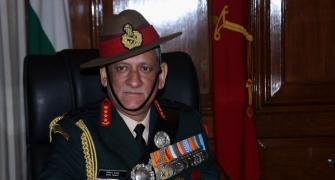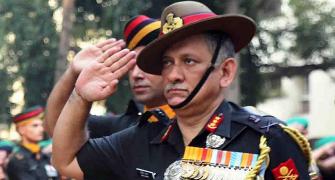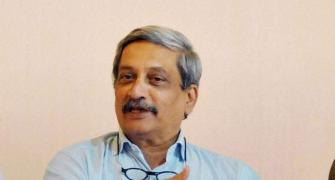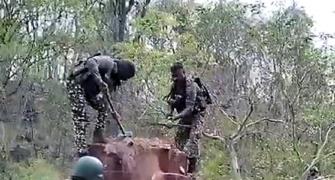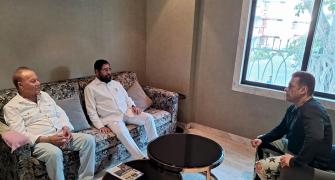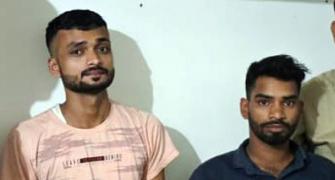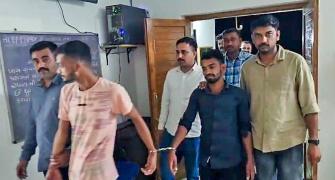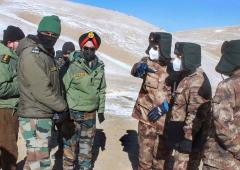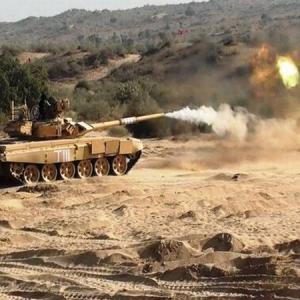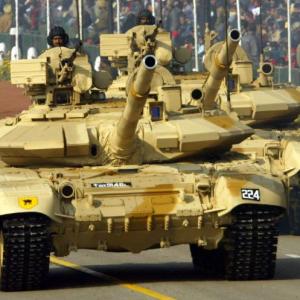'We have not seen even during Vajpayee's time what Modi and the BJP has adopted now,' says Colonel R Hariharan (Retd).
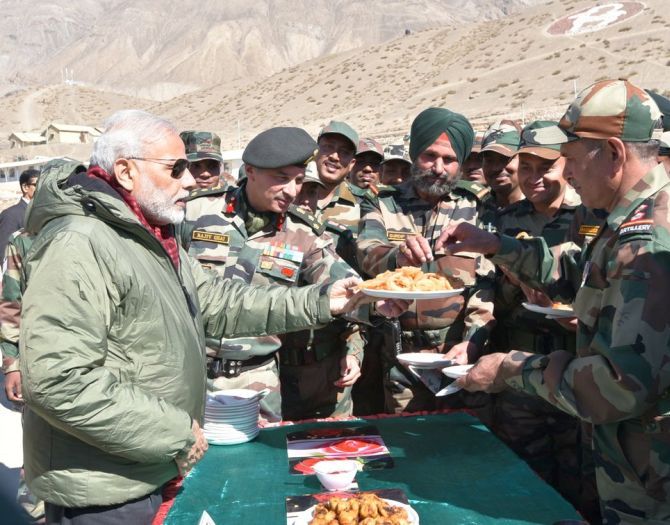
Colonel R Hariharan (retd), who served as head of intelligence for the Indian Peace Keeping Force in Sri Lanka between 1987 and 1990, had earlier spoken to Rediff.com on the One Rank One Pension issue when military veterans were on hunger strike at Jantar Mandir in New Delhi.
Colonel Hariharan joined the Indian Army in 1962 when India went to war with China and served for 29 years.
He tells Rediff.com's Shobha Warrier that politicians and bureaucrats have not understood how the army functions.
Do you feel there are reasons for ex-servicemen to be dissatisfied with the way OROP is implemented?
OROP is like a symptom. During Indira Gandhi's time, after the 1971 war, OROP was abolished. Till then, from the British times, OROP existed.
Since then, the struggle has been going on by veterans to get OROP back. Many cases were filed too.
And in the last few years, it became an electoral issue especially in Punjab, UP and Haryana from where lots of people are in the army.
The Congress party had promised OROP, but did not deliver; they just paid lip service to the issue.
(Punjab Congress leader) Captain Amarinder Singh was at the forefront of the demand. Modi also had promised during the elections to implement OROP and the ex-servicemen had rallied around him.
But what he delivered was not the definition accepted by Parliament and also the Supreme Court.
These people have coined a new one and not the earlier definition for various reasons, and implemented after a lot of delay.
Even now, the full amount has not been paid.
There are other anomalies in the Sixth Pay Commission and that is because they do not understand how the army functions.
The politicians are not interested and they have left it to the bureaucrats. This was pointed out by the K Subrahmanyam Committee also after the Kargil War.
According to the rules of conduct of the Government of India, who is responsible for national security? The defence secretary. And it is to be executed by the army.
It is like the responsibility is with somebody and execution is with somebody else.
With all respect to the brilliance of the IAS officers, they may not have much clue about the whole thing.
Shashi Tharoor has written a book in which he talks about a junior bureaucrat representing India while an experienced general had to sit silently at the UN Peacekeeping Conference. That was because the bureaucrat has the responsibility.
This kind of anomaly has damaged the relationship which was direct with the government.
I had served at army headquarters and I had seen the files where the chief of army staff wrote directly to the prime minister.
When did this change take place?
I don't know. You should find out.
This issue has been sidelined successfully over the years because of the ignorance of defence affairs by the politicians.
I am sure Nehru did not mean it when he said India did not need a military and only needed the police force as we are a peace loving nation.
Partially, the army is also responsible for this mindset because it was one of the successful instruments in protecting the British colonial interests as it was put together by the British from the (East India) Company days.
At the time of Independence, the commander-in-chief was high in the honour of precedence. Later the civil service took over.
Was it because the army did not assert itself that the bureaucracy got an upper hand?
Initially, they did assert. Sam Manekshaw did.
Politicisation of army chiefs might have happened successfully in due course. I don't have any proof, but I can quote any number of incidents where the chiefs of the armed forces were politically appointed.
For example, General (B M Kaul came during Nehru's time and was entrusted with the 1962 operations though there were much experienced officers there.
I think it was around that time that politicisation of defence appointments took place.
I don't want to comment about the later appointments because they are all retired and alive.
But there is a dynamic change in the kind of people who come to the army. The social dimension of the troops has changed. The jawans of today are better educated.
I don't think the political leadership of the country has understood the change in the dynamics.
They have simply abdicated the responsibility to the babus.
The net result is that these guys form an interface between the army and the political leadership.
General V K Singh, when he was chief of the army staff, wrote a letter to then defence minister A K Antony noting the deficiencies which made the army unfit for the war, right from ammunition to rifles to artillery guns.
The minister passed the buck to the general. Then he wrote to the prime minister too. Do you know what happened then?
I don't know who leaked the letter. Some people in Parliament wanted to take action against General V K Singh for writing to the prime minister, saying he was plotting to seize the government. This kind of distortions suited the media too.
OROP came after a lot of struggle of one year. (Defence Minister Manohar) Parrikar himself said he didn't understand the functioning of the army.
It took him one year to understand the complications of OROP.
Is the five-year revision the only reason for dissatisfaction now?
I don't want to go into the details now. There are other issues too like, for example, how the disability pension is calculated.
What I want to say is all the three chiefs have written so many times pointing out the anomalies before the Pay Commission and after the Pay Commission. What happened?
There is a word in English, glitch. That is what has happened.
The only thing that has happened is, some urgent procurement has been ordered.
You talk about Make in India when you have an R&D that has not been able to design a rifle, the basic weapon suiting the army's requirements.
After the Kargil War, the deficiencies have been pointed out, but even night vision devices are not there. It is nice talk about a fitting reply!
Prime Minister Narendra Modi says his is the government that finally implemented the OROP...
Yes, he has implemented it, only the concept.
I am not for a confrontation with the government.
At least, Parrikar now understands while Antony never understood and never showed any emotions or remorse.
He (Antony) has been under the helm of affairs all along.
With a crony corrupt system, we kept on buying 10-year-old technology.
I am sorry to say, in this country the corrupt guys have more influence than the army.
I don't think it will change because nobody seems to be changing the narrative.
You feel Modi's gesture of celebrating Diwali with the jawans will not strike a chord?
Let us not be naïve. The guy in the army has a higher qualification than a rural guy. Even the rural guys are not impressed with Rahulji's visit to the villages and eating with them. Those days are gone with Indiraji.
Today, when you have access to information, it is a different era. Every rural guy has a smart phone and he is exposed to information.
You mean people want action and not tokenism?
They want action and results. Mere activity is not enough; they want results.
Everybody attacked Rahul (Gandhi) after what he did after the suicide of the ex-serviceman.
All veteran groups directly attacked the politicians who used them.
Tell me who are these veterans? They are the people whose children are in the army.
The rich guys or the ministers don't send their children to the army; only the army veterans' children go. The jawans are fully aware that the veterans are making an effort.
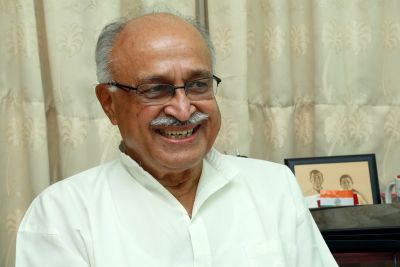 Though the prime minister asked his party and his ministers not to talk about the surgical strikes, do you feel they are trying to take political advantage? Do you feel they handled it in a mature way?
Though the prime minister asked his party and his ministers not to talk about the surgical strikes, do you feel they are trying to take political advantage? Do you feel they handled it in a mature way?
All parties and even the media took advantage of it. What do you mean by political advantage? That they must behave like the Congress?
Perhaps there is overhype, but then that is part of Modi's style.
Modi is a totally different man. It is a totally different party and they have a totally different agenda.
Why do we expect a different leadership to behave like the past ones?
I call the earlier way the inefficient way and not a mature way.
I don't think the surgical strike was done to take political advantage. It is the other way round.
It is part of the BJP's strategical narrative which Modi is executing. It's totally different from the Congress' narrative.
It's part of a big jigsaw puzzle that is pointed to place.
Pakistan was given enough opportunities to change its policy of sponsoring terrorism to attack India.
Even Modi's visit to Nawaz Sharif's granddaughter's wedding was done with an intention. It was the last chance.
Whatever it is, the surgical strikes came after three attacks.
There was a distinct change in Pakistan's attitude after the Pathankot attack.
The army is like Betal sitting on Nawaz Sharif's shoulders as far as India and strategic policies are concerned.
What happened was part of an overall narrative.
Modi is adopting a different strategic approach to national security. That is why China has hurriedly announced the CPEC (China Pakistan Economic Corridor). Pakistan is a country submerging in debts.
Why is China doing this? Because Modi's narrative is different.
Modi is assertive, not aggressive whereas the Congress government was a status quo government.
In fact, we have not seen even during (Atal Bihari) Vajpayee's time what Modi and the BJP has adopted now.
It could be because Vajpayee did not have this majority in Parliament.
IMAGES: TOP: Prime Minister Narendra Modi with soldiers in Himachal Pradesh. Photograph: Kind courtesy @narendramodi/Twitter
BOTTOM: Colonel R Hariharan. Photograph: Sreeram Selvaraj

